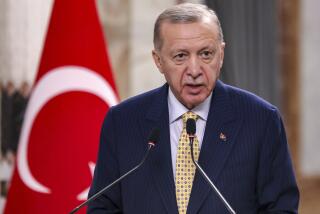Soviets Seek Role in Trade Negotiations : ‘Bombshell’ a Sign of Shift in Economic Policy, GATT Says
- Share via
GENEVA — The Soviet Union has asked to take part in the new round of global trade liberalization negotiations, the General Agreement on Tariffs and Trade said today.
One GATT official said privately that the Soviet request is “a bombshell indicating major changes in Soviet policy” and a a major effort by Soviet leader Mikhail S. Gorbachev to revamp the Soviet economy so it can participate in the trade bloc.
For years, Moscow called GATT “an instrument of Western economic imperialism”--an attitude that the GATT official said has obviously been dropped by Gorbachev.
Moscow told GATT that it plans changes in its foreign trade system and a reorganization of its economy in general, a GATT spokeswoman said.
To ‘Gain ... Experience’
It said participation in the trade negotiations will help it “gain the experience required to arrive at a decision on accession” to GATT itself, the spokeswoman said.
The Soviet Union is the only major trading nation outside GATT, whose 92 “contracting parties” or members account for about 85% of total world trade.
Moscow made several private soundings in the past two years about joining the global trade regulatory body but met with negative reactions from the United States and other Western nations.
Western countries as well as most of the other parties fear that Soviet membership would politicize GATT and also cause major problems because of Moscow’s centrally planned economic system.
Sept. 15 in Punta del Este
GATT officials said the Soviet request to take part in the new round will be considered by ministers in Punta del Este, Uruguay, where the forthcoming session will be held starting Sept. 15.
Moscow’s move to participate in GATT followed China’s formal request last month to become a member of the group.
GATT, which is not a U.N. agency, was established in 1948 with the aim of promoting free trade and blocking protectionism through governments imposing customs duties or import tariffs as well as quota restrictions on foreign goods.
Several smaller communist countries like Hungary, Czechoslovakia, Romania and Poland belong to GATT but not the other East Bloc nations of East Germany and Bulgaria.
Fixed Import Increases
Because communist nations do not have the same system of import tariffs as other countries, East Bloc states have to pledge themselves to fixed annual increases in imports in return for easier access to foreign markets for their own goods.
The new round in September of liberalization talks will be launched by trade ministers at the Punta del Este meeting. Later negotiations will take place in Geneva and are expected to last four or five years.
The talks follow similar major trade liberalization endeavors like the Kennedy Round of the 1960s and the Tokyo Round of the 1970s.
GATT Director General Arthur Dunkel of Switzerland informed member nations of the Soviet request to participate in the GATT talks in a letter last week.
More to Read
Sign up for Essential California
The most important California stories and recommendations in your inbox every morning.
You may occasionally receive promotional content from the Los Angeles Times.









